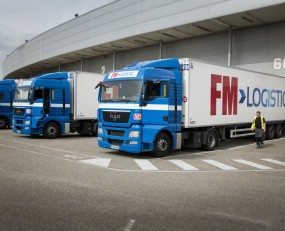
FM Logistic posted revenues of €1.43bn for the year ending March 31, 2020, up 8.7% from a year earlier (8% excluding FX effects). The company’s earnings before interest and taxes (EBIT) was €42.5m, an increase of 21% compared with the previous year. These results reflect the company’s focus on growing organically and more selectively and profitably, thanks to strong customer relationships and improved operational performance.
Transport revenue exceeded €500m (36% of the total). It benefited from the expansion of less-than-truckload (LTL) as well as urban logistics services. The FM Logistic Citylogin service, which combines last-mile deliveries and small urban logistics hubs, is now available in about 30 cities in Europe. The latest additions to the list are the Spanish towns of Bilbao, Saragoza and Cordoba.
Revenues were well distributed across geographies, with France representing 38% and other countries 62%. Revenue in France grew 7.7% to €550m. In central and eastern Europe, revenue growth ranged from 8% to 16%.
FM Logistic maintained commercial momentum in 2019/20 by signing new contracts worth more than €150m. Sales growth was especially strong in the cosmetics/beauty (+20%) and e-commerce logistics sectors, particularly in France, Spain, India and Russia. In the latter country, e-commerce volumes handled by FM Logistic rose 32% in 2019 from the previous year. In France, FM Logistic won a major contract to supply e-commerce logistics services to a large international retailer.
FM Logistic continued to build its presence in emerging markets. It opened new multi-client warehouses and distribution centres in India and Vietnam to meet the long term demand for higher end supply chain services and facilities. FM Logistic gained multiple new contracts in Vietnam. The turnaround of the Brazil business continued under the leadership of the managing director appointed in 2019. The Ukraine unit confirmed its turnaround.
Revenue growth was also supported by the introduction of new services meeting consumer trends, such as the rise in e-commerce and sustainability. As an example, FM Logistic introduced supply chain solutions for manufacturers and retailers that sell bulk products in retail stores and supermarkets, as well as dropshipping services for manufacturers who sell their products directly to consumers via marketplaces.
FM Logistic also continued automating selected warehouse and office processes. Additional AGVs and robotic arms have been put into operation. The number of users of MySCM, the company’s online customer portal, increased by 9.5%. The digitalisation of transport documents was also a focus.
Source: FM Logisitic